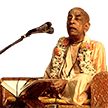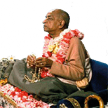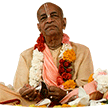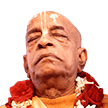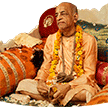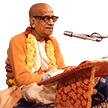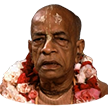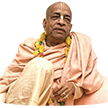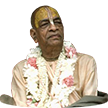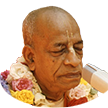Transformation - an essential subject: Difference between revisions
(Created page with "Category:Essential Subjects <!----------------------- edit below this line -----------------------> <!------------------------ begin introduction text below --------------...") |
(Vanibot #0041: Moves Choose Another box to the end) |
||
| Line 2: | Line 2: | ||
<!----------------------- edit below this line -----------------------> | <!----------------------- edit below this line -----------------------> | ||
<!------------------------ begin introduction text below ------------------------> | <!------------------------ begin introduction text below ------------------------> | ||
A pure devotee sees the material quality of goodness as the Lord's bodily effulgence. For him the quality of ignorance is transformed into peacefulness and equanimity. And he transforms lust, a product of the mode of passion, to love and serve the supremely beautiful Lord. He meditates on how to serve the Supreme Lord, and then with enthusiasm and patience he performs all kinds devotional service. In the devotional mellow of śānta, or neutrality, such devotional enthusiasm may be absent, but because such a mood of devotion attracts the Lord's love, it is fully spiritual. | |||
Srila Prabhupada's books, lectures, conversations and letters offer a comprehensive presentation of this essential subject as seen in the Vaniquotes '''[[Vaniquotes:Category:Transformation|Transformation]]''' category. An introduction from his books is given below in the following | Srila Prabhupada's books, lectures, conversations and letters offer a comprehensive presentation of this essential subject as seen in the Vaniquotes '''[[Vaniquotes:Category:Transformation|Transformation]]''' category. An introduction from his books is given below in the following 11 quotes. | ||
<!-------- end introduction text and don't touch next three lines ---------> | <!-------- end introduction text and don't touch next three lines ---------> | ||
---- | ---- | ||
== Quotes from Srila Prabhupada's books == | == Quotes from Srila Prabhupada's books == | ||
<!----------------- edit quote boxes below this line -----------------> | <!----------------- edit quote boxes below this line -----------------> | ||
{{VaniQuotebox| | {{VaniQuotebox|A learned man never laments over a subject which appears and disappears as a matter of course. The material body, which we get from the womb of our mother, becomes transformed after some time into ashes, earth, or stool, as the case may be|A learned man never laments over a subject which appears and disappears as a matter of course. The material body, which we get from the womb of our mother, becomes transformed after some time into ashes, earth, or stool, as the case may be. And the subtle mental body, which is also material and composed of false ego and intelligence, likewise vanishes when the soul is liberated. '''(Message of Godhead, Chapter 1)'''}} | ||
{{VaniQuotebox| | {{VaniQuotebox|According to the Mayavada philosophy, the cosmic manifestation is an illusory transformation of the Absolute Truth, which has no separate existence outside the cosmic manifestation. This is not the message of the Vedanta-sutra|The Māyāvādīphilosophers have the audacity to reject the purport of what Vyāsadeva explained in the Vedānta-sūtra and to say he attempted to establish a doctrine of transformation of the Supreme, which is totally imaginary. According to the Māyāvāda philosophy, the cosmic manifestation is an illusory transformation of the Absolute Truth, which has no separate existence outside the cosmic manifestation. This is not the message of the Vedānta-sūtra. '''(Teachings of Lord Caitanya, Chapter 25)'''}} | ||
{{VaniQuotebox| | {{VaniQuotebox|According to the Mayavadi philosophers, the Supreme Brahman has transformed Himself into many varieties of forms, but that is not the fact. He is always transcendental to the actions and reactions of the material gunas|Arieties of phenomena occur within this universe on account of the actions and reactions of the three material modes, but the original creator, or the cause, is the Supreme Personality of Godhead, who is mentioned here as nimitta-mātram, the remote cause. He simply pushes the wheel with His energy. According to the Māyāvādī philosophers, the Supreme Brahman has transformed Himself into many varieties of forms, but that is not the fact. He is always transcendental to the actions and reactions of the material guṇas, although He is the cause of all causes. '''(Śrīmad-Bhāgavatam 4.11.17)'''}} | ||
{{VaniQuotebox| | {{VaniQuotebox|Ahankara, or false ego, is transformed into the demigods, the controlling directors of material affairs|Ahaṅkāra, or false ego, is transformed into the demigods, the controlling directors of material affairs. As an instrument, the false ego is represented as different senses and sense organs, and as the result of the combination of the demigods and the senses, material objects are produced. In the material world we are producing so many things, and this is called advancement of civilization, but factually the advancement of civilization is a manifestation of the false ego. '''(Śrīmad-Bhāgavatam 3.26.26)'''}} | ||
{{VaniQuotebox| | {{VaniQuotebox|Although the energies are simultaneously one with the Lord and different from Him, the Lord never loses His personal form due to the transformation of His different energies|The theory of illusion can be applied to a person who identifies himself with the body. The living entity is the superior energy of the Supreme Lord, and the material world is the inferior energy. Both, however, are prakṛti (energy). Although the energies are simultaneously one with the Lord and different from Him, the Lord never loses His personal form due to the transformation of His different energies. '''(Caitanya-caritāmṛta, Madhya-līlā 6.173)'''}} | ||
{{VaniQuotebox| | {{VaniQuotebox|Knowledge in the matter of the bodily necessities of eating, sleeping, mating and fearing, transformed into various branches of advancement of knowledge, is all temporary|Knowledge in the matter of the bodily necessities of eating, sleeping, mating and fearing, transformed into various branches of advancement of knowledge, is all temporary. A living being is not the material body but an eternal part and parcel of the Supreme Being, and thus revival of his self-knowledge is essential. Without this knowledge, the human life is baffled. The servants of the Lord, Viṣṇu, are entrusted with this responsible work, and so they wander over the earth and to all other planets in the universe. '''(Śrīmad-Bhāgavatam 3.4.25)'''}} | ||
{{VaniQuotebox| | {{VaniQuotebox|Living entities also have partial independence, but by misuse of their independence, when the service attitude is transformed into the propensity for sense enjoyment, they come under the sway of lust|The Supreme Personality of Godhead expanded Himself into many for His ever-increasing spiritual bliss, and the living entities are parts and parcels of this spiritual bliss. They also have partial independence, but by misuse of their independence, when the service attitude is transformed into the propensity for sense enjoyment, they come under the sway of lust. This material creation is created by the Lord to give facility to the conditioned souls to fulfill these lustful propensities, and when completely baffled by prolonged lustful activities, the living entities begin to inquire about their real position. '''(Bhagavad-gītā 3.37)'''}} | ||
{{VaniQuotebox| | {{VaniQuotebox|Living entities are fallible because when they come in contact with the material world they lack their spiritual identity, and thus the body materially obtained becomes subjected to birth, growth, transformation, situation, deterioration and annihilation|The living entities are fallible because when they come in contact with the material world they lack their spiritual identity, and thus the body materially obtained becomes subjected to birth, growth, transformation, situation, deterioration and annihilation under the laws of nature. '''(Śrīmad-Bhāgavatam 1.11.25)'''}} | ||
{{VaniQuotebox|Mayavada philosophy states that the Supreme Lord, the living entities and the cosmic manifestation are all transformations of illusory energy. To support this atheistic theory, the Mayavadis cite false scriptures|Māyāvāda philosophy states that the Supreme Lord, the living entities and the cosmic manifestation are all transformations of illusory energy. To support this atheistic theory, the Māyāvādīs cite false scriptures, which make people bereft of transcendental knowledge and addicted to fruitive activities and mental speculation. '''(Caitanya-caritāmṛta, Madhya-līlā 6.182)'''}} | |||
{{VaniQuotebox|Eternal love for Krsna is transformed into lust|When a living entity comes in contact with the material creation, his eternal love for Kṛṣṇa is transformed into lust, in association with the mode of passion. Or, in other words, the sense of love of God becomes transformed into lust, as milk in contact with sour tamarind is transformed into yogurt. Then again, when lust is unsatisfied, it turns into wrath; wrath is transformed into illusion, and illusion continues the material existence. Therefore, lust is the greatest enemy of the living entity, and it is lust only which induces the pure living entity to remain entangled in the material world. '''(Bhagavad-gītā 3.37)'''}} | |||
{{VaniQuotebox|Different bodies and capacities are simply transformations of the earth that exist in name only, for everything grows out of the earth and when everything is annihilated it again mingles with the earth|All of us on the surface of the globe are living entities in different forms. Some of us are moving and some not moving. All of us come into existence, remain for some time and are annihilated when the body is again mingled with the earth. We are all simply different transformations of the earth. Different bodies and capacities are simply transformations of the earth that exist in name only, for everything grows out of the earth and when everything is annihilated it again mingles with the earth. In other words, we are but dust, and we shall but be dust. Everyone can consider this point. '''(Śrīmad-Bhāgavatam 5.12.8)'''}} | |||
<!----------------- edit quote boxes above this line -----------------> | <!----------------- edit quote boxes above this line -----------------> | ||
| Line 31: | Line 37: | ||
'''Transformation - [[Vaniquotes:Category:Transformation|explore more within this category]]'''. | '''Transformation - [[Vaniquotes:Category:Transformation|explore more within this category]]'''. | ||
{{EsentialSubjectTotal}} | {{EsentialSubjectTotal}} | ||
<div style="float:left;"> | |||
{{EssentialSubjectnav}} | |||
</div> | |||
__NOTOC__ | __NOTOC__ | ||
__NOEDITSECTION__ | __NOEDITSECTION__ | ||
Latest revision as of 17:59, 22 November 2020
A pure devotee sees the material quality of goodness as the Lord's bodily effulgence. For him the quality of ignorance is transformed into peacefulness and equanimity. And he transforms lust, a product of the mode of passion, to love and serve the supremely beautiful Lord. He meditates on how to serve the Supreme Lord, and then with enthusiasm and patience he performs all kinds devotional service. In the devotional mellow of śānta, or neutrality, such devotional enthusiasm may be absent, but because such a mood of devotion attracts the Lord's love, it is fully spiritual.
Srila Prabhupada's books, lectures, conversations and letters offer a comprehensive presentation of this essential subject as seen in the Vaniquotes Transformation category. An introduction from his books is given below in the following 11 quotes.
Quotes from Srila Prabhupada's books
Transformation - explore more within this category.
Vanipedia has now over 903 introductory articles compiled from Srila Prabhupada's books under the series titled Essential Subjects. All these articles can be seen in the Table of Content on the right side of this article and also here in this Umbrella Category. Browse through them to relish the breadth and depth of Srila Prabhupada's teachings - There is a subject for everyone.

